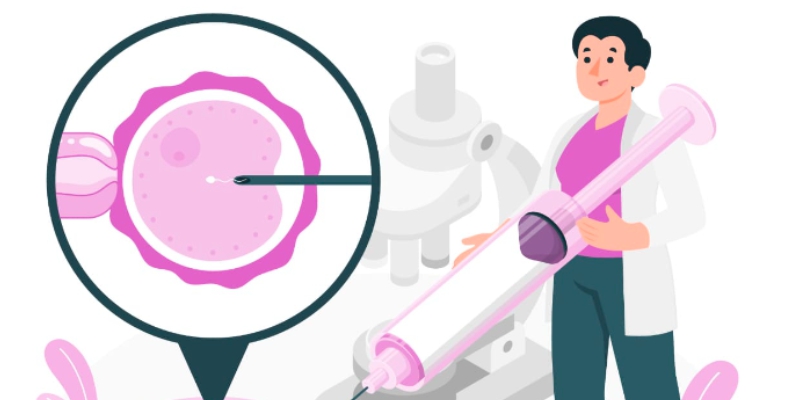
IVF vs. ICSI Fertility Treatment

Author - Dr. Vandana Narula, MBBS, MD (Obstetrics & Gynaecology)
Consultant - Infertility specialist in sector 43 Chandigarh
IVF vs. ICSI Fertility Treatment
Assisted reproductive technology (ART) is a technique used in fertility treatments. Out of which, in-vitro fertilization (IVF) and intracytoplasmic sperm injection (ICSI) are two procedures. According to Dr Vandana Narula, MBBS, MD (Obstetrics & Gynaecology), both IVF and ICSI are safe and effective methods of ART. The choice of treatment, however, depends on the medical condition of the patient. The best IVF doctor in Chandigarh conducts a series of tests to ascertain the type of procedure.
What is IVF?
IVF or in-vitro fertilization is a process wherein your eggs are fertilized with sperm in a laboratory. The resulting embryo or fertilized egg is kept in an incubator for 3-5 days. Once fertilized, the egg is transferred into the womb.
What is ICSI?
During ICSI or intracytoplasmic sperm injection, a single sperm selected by your doctor is injected into the egg. The fertilized egg is transferred into your womb in the same manner as IVF.
Difference Between IVF and ICSI
The best IVF specialist in Mohali tells us that the fundamental difference between IVF and ICSI is how the sperm fertilizes the egg.
IVF is mostly used for female infertility or unexplained infertility. ICSI, on the other hand, is used when there is male infertility involved. At times, the top IVF doctor in Chandigarh may recommend ICSI when there is no male cause of infertility to increase the chances of having a baby.
The steps involved in both the processes are:
1. Hormone Stimulation
In both procedures, the woman’s ovaries are stimulated with the help of injectable fertility drugs.
2. Egg Retrieval
Once the eggs are matured, they are retrieved from the woman’s body.
3. Embryo Development
With IVF, sperm from a male partner or donor are added to the eggs to allow fertilization. With ICSI, the best IVF doctor in Chandigarh carefully picks one single sperm and injects it into each eff with the help of a microscopic needle. These eggs and sperm are kept in the laboratory for up to 5 days to facilitate embryo development.
4. Embryo Transfer
If the eggs are fertilized and embryos are developed, one embryo is placed in the woman’s uterus. In some cases, the top IVF doctor in Chandigarh may also place two embryos for a successful pregnancy.
5. Pregnancy Test
Two weeks after the embryo transfer, your best IVF specialist in Mohali conducts a blood test to check pregnancy.
- If the test is positive, an ultrasound examination will also be scheduled to check the pace of pregnancy.
- If the test is negative, you can try the process again or discuss other treatment modalities with your doctor.
When is ICSI Recommended?
ICSI is used when the sperm is unlikely to fertilize an egg naturally. This is done when:
- The sperm count is very low.
- Sperm has a high rate of abnormality.
- Sperm cannot move properly.
- Sperm is retrieved directly from the epididymis or the testicles.
- High levels of antibodies in the semen.
- Previous failed attempts with IVF.
- Sperm has previously been frozen.
Risks Associated with IVF and ICSI
The risks associated with IVF and ICSI include:
- Excessive response to fertility drugs.
- Multiple births.
- Premature labour or low birth weight.
- Increased risk of birth defects.
- Caesarean delivery.
Both IVF and ICSI are safe and effective procedures for artificial pregnancy. ICSI can be considered as an advanced form of IVF with the process almost remaining the same. The choice of the procedure depends on your age and other medical conditions. If you are suffering from infertility, consult Dr Vandana Narula at the Motherhood Hospitals.
Related Blogs

Understanding Different Types of Vaginal Birth Delivery
Read More
How to Treat and Prevent Brown Discharge
Read More
Endometriosis Understanding, Diagnosing, and Managing the Condition
Read More
Emotional Support During IVF Treatment
Read More
Understanding Gestational Diabetes: Insights from Dr Shruthi Kalagara
Read More
Urinary Tract Infection (UTI) in Pregnancy
Read More
Early Pregnancy Care for New Pregnant Women: Expert Advice | Motherhood Hospitals
Read More
Body Positivity Tips Post C Section (Cesarean Delivery)
Read More
Vaginoplasty: Procedure, Cost, Risks & Benefits, Recovery
Read More
The Digital Dilemma: Exploring the Medical Implications of Technology on Child Development
Read MoreRequest A Call Back
Leave a Comment:
View Comments
Previous
Next
HELLO,
Stay update don our latest packages, offer, news, new launches, and more. Enter your email to subscribe to our news letter


 Toll Free Number
Toll Free Number








No comment yet, add your voice below!